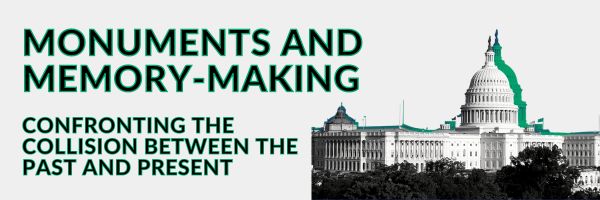
Abigail Perkiss
Professor of History
Kean University
Recently, one of my students told me that it was impossible to truly put himself into the mindset of the role he had been assigned, because he would have been seeing the past through his 2023 eyes. As instructors, we do our best to acknowledge and mitigate this inevitable collision of past and present – of a student’s contemporary predicament influencing the way they understand and interact with a role, a text, a historical moment.
But what happens when the game asks students to confront this very collision, and calls on them to understand that our present impacts our understanding of the past as much as our past impacts our present?
Suddenly, their current reality becomes a site of inquiry, an entry point into the ways we as a society experience and make sense of the past, and how those meanings become contested.
Such is the case for Monuments and Memory-Making. When my co-authors, Rebecca Livingstone and Kelly McFall, and I began conceiving of this game – in 2013 – we aimed to give students a glimpse into the creation of collective memory by entering contest over the construction of the Vietnam Veterans Memorial. We wanted students to consider how we create a national memory of our collective past. How we move on from a lost war. How we remember the dead while honoring the living. How we reunite a fractured nation.
We wanted students to understand that the past is neither fixed nor concrete, that empirical evidence is always viewed through the lens of the contemporary reality in which it is interpreted. We wanted them to see that the struggle for the memorialization of the Vietnam conflict was rooted as much in the civic life and politics of the late 1970s and the early 1980s as it was in the preceding decades of fighting.
Nine years later, as we were finalizing the manuscript for production, armed insurrectionists stormed the US Capitol, brandishing the flag of the Confederacy. Though the history of the Capitol attack was – is – still being written, it was clear early on that this act was more than a mere nod to the past. In the halls of the Capitol, in congressional chambers, and through the streets of Washington, DC, those who participated in the attack invoked an interpretation of history that called back to the aftermath of the US Civil War, when former enslavers fought to memorialize the southern cause as noble and just, a heroic battle to preserve the ways of the South while minimizing the brutality of the system of slavery.
This fight over the narrative of the Civil War – so deep as to challenge the naming of the war itself – has pervaded American life for more than 150 years. In the wake of the conflict, southerners held dear to this noble “lost cause” narrative, as northerners sought to celebration widespread triumph and the reclamation of a united nation. Today, as historians center the experience of enslaved people and the consequences of slavery in retelling the period, white supremacists like those who invaded the US Capitol on January 6 evoke the Confederacy to push back on the ideas of federal oversight and racial justice reform, lionizing those who fought as victims of an aggressive northern campaign to dismantle southern customs and traditions.
These debates over the past are not simply academic exercises; they matter because the way we understand and make sense of our collective past informs how we make sense of our contemporary reality. These efforts to commemorate a past as the past stem from our desire to craft a national collective memory of what has come before.
In 2013, we envisioned Monuments and Memory-Making as a game that would call on students to interrogate the relationship between past and present in the early 1980s. We didn’t conceive of the game as an opportunity for students and instructors to contemplate current events in the time and place in which they were playing the game.


